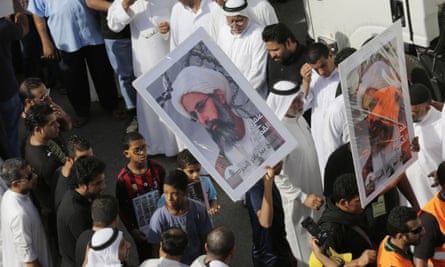The Iranian government and religious leaders across the Middle East have condemned Saudi Arabia’s execution of a prominent Shia cleric and warned of repercussions that could bring down the country’s royal family.
In a serious escalation of religious and diplomatic tensions in the region, councils and clerics in Iran, Yemen and Lebanon said the killing of Sheikh Nimr al-Nimr would prompt widespread anger.
Iran’s foreign ministry spokesman, Hossein Jaber Ansari, accused Riyadh of hypocrisy. “The Saudi government supports terrorists and takfiri [radical Sunni] extremists, while executing and suppressing critics inside the country,” he told the Iranian state news agency.
In Bahrain, police fired teargas at several dozen people protesting against the cleric’s execution, a witness said. Demonstrators carrying pictures of Nimr faced security forces in a standoff in Abu-Saiba, a Shia village west of the capital, Manama.
Activists have called for protests in the Sunni-ruled kingdom, a sign that Nimr’s death may further inflame sectarian tensions in the Middle East.
The execution was described as a “grave mistake” by the Supreme Islamic Shia Council in Lebanon and a “flagrant violation of human rights” by Yemen’s Houthi movement.
Ayatollah Ahmad Khatami, a leading Iranian cleric, said repercussions would bring down the Saudi ruling family.
He told the Mehr news agency: “I have no doubt that this pure blood will stain the collar of the House of Saud and wipe them from the pages of history. The crime of executing Sheikh Nimr is part of a criminal pattern by this treacherous family … the Islamic world is expected to cry out and denounce this infamous regime as much as it can.”
Nimr was one of 47 people Saudi Arabian executed for terrorism on Friday. The interior ministry said most of those killed were involved in a series of al-Qaida attacks between 2003 and 2006.
It also detained hundreds of minority Shia Muslims after protests between 2011 and 2013, during which several police officers were killed in shootings and petrol bomb attacks. Several of those held were sentenced to death.
The interior ministry statement began with verses from the Qur’an justifying the use of execution, and state television showed footage of the aftermath of al-Qaida attacks in the last decade. The Saudi grand mufti, Sheikh Abdulaziz Al al-Sheikh, appeared on television soon after to describe the executions as just.
Iran’s Shia leadership said the execution of Nimr “would cost Saudi Arabia dearly”. The brother of the cleric said the family was shocked by news of his execution but hoped that any reaction would be peaceful.
“Sheikh Nimr enjoyed high esteem in his community and within Muslim society in general and no doubt there will be reaction,” Mohammed al-Nimr told Reuters by telephone. “We hope that any reactions would be confined to a peaceful framework. No one should have any reaction outside this peaceful framework. Enough bloodshed.”
In October 2015 Saudi Arabia’s supreme court rejected an appeal against the death sentence passed earlier on Nimr, who had called for pro-democracy demonstrations and whose arrest in 2012 sparked protests in which three people died.

Nimr had long been regarded as the most vocal Shia leader in the eastern Saudi province of Qatif, willing to publicly criticise the ruling al-Saud family and call for elections. He was, however, careful to avoid calling for violence, analysts say.
That did not prevent the interior ministry from accusing him of being behind attacks on police, alongside a group of other suspects it said were working on behalf of Iran, the kingdom’s main regional rival.
The simultaneous execution of 47 people on security grounds was the biggest such event in Saudi Arabia since the 1980 killing of 63 jihadi rebels who seized Mecca’s Grand Mosque in 1979.
The executions are Saudi Arabia’s first in 2016. At least 157 people were put to death last year, a significant increase on the 90 people killed in 2014.